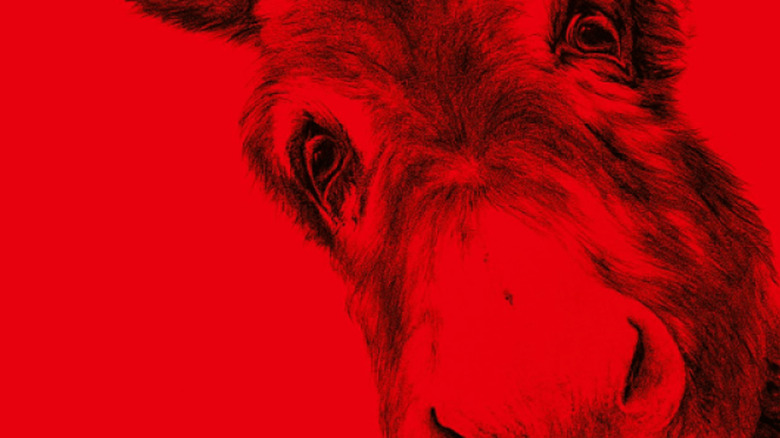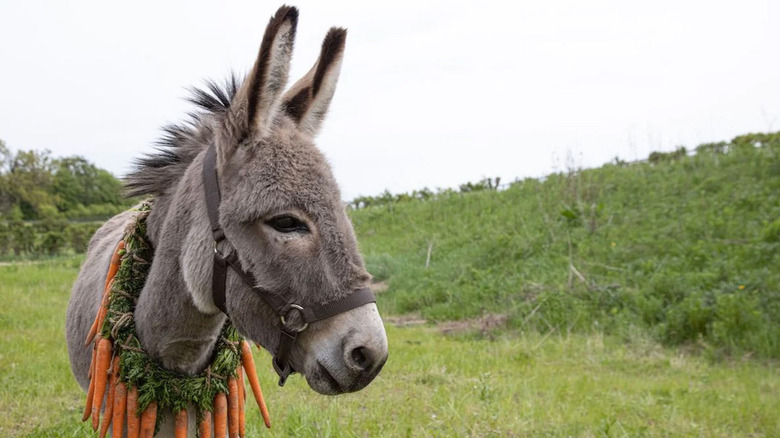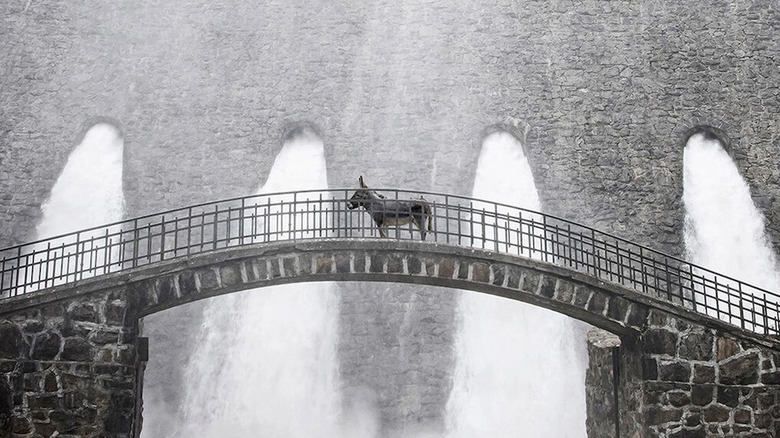EO Review: A Damning Take On Humanity's Relationship With Animals [Cannes]
How would a humble animal perceive humanity? "EO" attempts to answer that question by following a lowly donkey through the ups and downs of his life.
Directed by Jerzy Skolimowski, "EO" is based on the 1966 Robert Bresson film, "Au Hasard Balthazar." Much like its predecessor, it's told from the point-of-view of a donkey ... and the choice of animal is no coincidence. Throughout human history, the donkey has been our beast of burden and poor EO is no different. He starts out as a circus performer — part of a slightly surreal act in a Polish circus alongside his handler and loving owner, who bakes him carrot scones and treats him like a family member. But tragedy soon strikes when authorities step in. The circus is shut down as they're not allowed to use animals anymore ... and EO, along with the other animals, is taken away.
The image of a donkey crying may at first seem a bit silly, but as EO is cast out into an unforgiving world, you find yourself revisiting this image several times. What unfolds is essentially a movie that's "Forrest Gump" if Forrest was a donkey. But it has a lot to say about our attitudes towards animals, too.
A Beast of Burden
EO's strange adventure is depicted through a series of sentimental yet surreal vignettes. Making his escape from a donkey sanctuary, EO finds himself on the road, ambling from one predicament to the next. His haughty braying "eee-ohhh," as well as the occasional huffs, are the only communication we get from EO. He is, after all, a donkey. But Skolimowski's close camera work and gripping story keep us alongside EO every step of the way. We're all rooting for him. And even when scenes veer ever more into the surreal side of things, we can't help but feel connected to the little donkey that could.
In fact, the most fascinating aspect of "EO" is how the donkey makes sense of its surroundings, and what the humans around him are doing, and why. A surprising cameo from Isabelle Huppert highlights the absurdity of what you're watching, while glimpses of Jewish burial grounds and football violence offer a stark reminder of what humanity is capable of — even unto itself.
Meanwhile, EO is subjected to some cruel acts throughout his journey — at one time, he's picked up by a local council worker as a mascot for his football team ... only to be beaten by rival thugs in an unprovoked attack. The harrowing experiences of an innocent animal subjected to the violent wrath of man is gut-wrenching. It's worse still through the lens of EO, who never quite understands his own misfortune.
And so, he ambles on, from one predicament to the next.
The wonderful thing about EO
There's a certain quiet dignity in "EO" that you won't find in a film about human beings.
Despite all his predicaments, and all his misfortunes, EO maintains his innocence. He's merely passing through, a bystander who gets caught up in the trials and tribulations of the people around him. He observes, he witnesses, and then he moves on.
He never gets involved. How could he? He's only a donkey. And so, you're left to ponder how much this says about EO and how much this instead reflects the horrors of man. Just what are we doing to those creatures who don't have a say? How would they perceive our actions? Are we rescuing those poor defenseless animals from the circus or taking them away from the only home they know and love?
It's an interesting thought that's brought to life through Skolimowski's impeccable camera work and flair for visual style. You'll find neon-drenched scenes and surrealist flashes of color alongside more epic and sweeping scenes as EO stands triumphant beneath a waterfall. But what they all have in common is framing EO as an outsider. A passer-by. A bystander in his own story. And what else could he be?
Although "EO" gives us a lot to think about, it poses no solutions, simply allowing EO to stand on his own four legs — a provocative symbol of how we treat the fellow creatures of our world. In this sense, Skolimowski may tell EO's story, but he refuses to give him a voice — a deliberate choice that highlights the futility of his plight. EO's fate is in our hands. It's up to us what we do with it.
/Film Rating: 7 out of 10
"EO" premiered as part of the Cannes Film Festival 2022.


